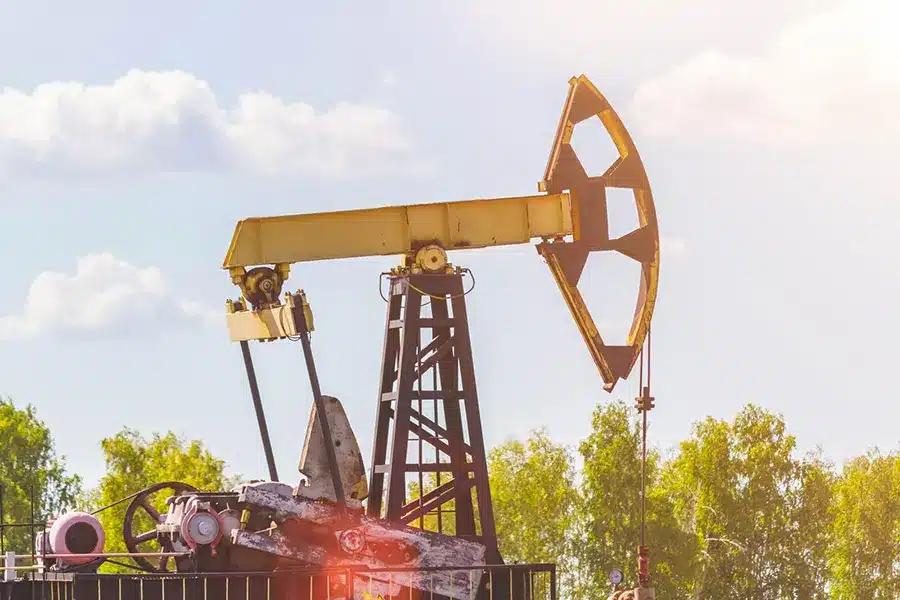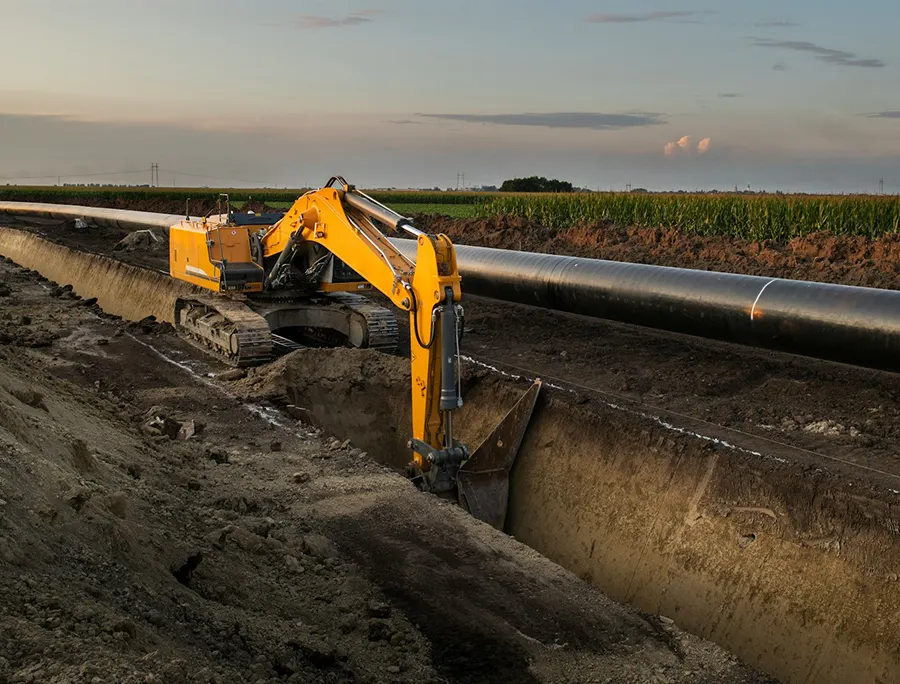Learn about your right to workers’ compensation benefits after an injury or illness in the
oil or gas industry
Working in the oil and gas industry in Charlotte, North Carolina, comes with its own set of risks and hazards. While these jobs are crucial for our energy needs and local economy, they’re also among the most dangerous, with workers regularly exposed to potential accidents and health hazards.
If you’re an oil and gas worker who has suffered an injury, illness or disease due to your job, it’s important to know that you might be entitled to workers’ compensation.
This essential guide outlines the types of accidents and health risks prevalent in the oil and gas sector and walks you through the steps to secure the workers’ compensation benefits you deserve. Whether you’re dealing with an injury from a worksite accident or suffering from a long-term occupational disease, understanding your rights is the first step to ensuring your financial and medical needs are met.
Have questions about your claim?
Wilder Pantazis Law Group can help. Schedule a free consultation today.
What is the injury rate in oil and gas?
According to the Centers for Disease Control and Prevention (CDC), between 2014 and 2019, approximately 470 workers in gas and oil extraction suffered fatal work injuries. The most common causes of these fatal events were:
- Vehicle incidents (26.8%)
- Contact injuries (21.7%)
- Explosions (14.5%)
Notably, independent contractors accounted for about 75% of these fatalities, and around 20% of the cases involved workers who were working alone at the time of the incident.
What are the most common injuries in the gas and oil industries?
The Occupational Safety and Health Administration (OSHA) has identified the following as the most serious safety hazards leading to injuries and death in oil and gas extraction:
- Vehicle collisions. The oil and gas industry often requires the transportation of workers and equipment to remote sites, leading to a high risk of highway vehicle crashes. These incidents are a leading cause of fatalities in this sector and frequently lead to injuries like broken bones, brain injuries, whiplash and spinal cord injuries.
- Falls. Workers are often required to operate at heights, making them susceptible to falls from platforms, masts and other elevated equipment, leading to a range of traumatic injuries.
- Explosions and fires. The risk of fire and explosion is high due to the presence of flammable gasses and vapors, as well as ignition sources like static, electrical energy, open flames and hot surfaces. Such accidents can lead to burns and disfigurement.
- Confined space hazards. Entering and working in confined spaces, such as storage tanks and pits, exposes workers to risks like asphyxiation and other respiratory problems from exposure to hazardous chemicals.
- Ergonomic hazards. These arise from activities like lifting heavy items, bending, reaching overhead and performing repetitive tasks, leading to strains, sprains and musculoskeletal injuries.
- Struck-by/caught-in/caught-between incidents. These accidents occur frequently due to moving vehicles, equipment, high-pressure lines, and falling equipment in the field. These hazards account for a significant portion of on-site fatalities and serious injuries, like fractures and amputations.
- High-pressure lines and equipment. Workers may be exposed to hazards from high-pressure lines and equipment, leading to injuries from leaks, bursts or failed connections.
- Electrical and other hazardous energy exposures. Improperly installed or maintained equipment can expose workers to uncontrolled electrical, mechanical and hydraulic energy sources, leading to burns and internal organ damage.
- Machine hazards. The use of a wide variety of rotating equipment and machinery can pose risks of being struck by or caught between unguarded machines, leading to broken bones, amputations and internal bleeding.
In addition to these safety hazards, workers are also at risk of the following health hazards:
- Exposure to diesel particulate matter emitted from diesel engines, which can affect respiratory health
- Exposure to hydrocarbon gasses vapors (HGVs) and situations where oxygen levels are dangerously low
- Exposure to hydrogen sulfide, a toxic gas encountered during drilling and extraction processes
- Exposure to radiation from materials naturally present in the earth’s crust
- Exposure to high levels of noise from machinery and equipment, leading to hearing loss
- Exposure to silica dust, leading to silicosis, particularly in hydraulic fracturing operations, which can cause lung diseases
- Exposure to temperature extremes from working in environments with extreme heat or cold, which can lead to various health issues
Effective planning and prevention strategies, including hazard evaluation, safety program implementation and training, and use of personal protective equipment (PPE), are crucial for minimizing these risks in the oil and gas extraction industry.
Organizations like OSHA and the National Institute for Occupational Safety and Health (NIOSH) are involved in evaluating and controlling these hazards to ensure workers’ health and safety.
Are oil and gas workers entitled to workers’ compensation in North Carolina?
Yes, most oil and gas workers in North Carolina are entitled to workers’ compensation. In North Carolina, employers are generally required to provide workers’ compensation coverage if they have 3 or more employees. This coverage includes workers in the oil and gas industry.
Workers’ compensation insurance provides benefits to employees who suffer work-related injuries or occupational diseases or illnesses. Workers’ comp benefits can include coverage for:
- Medical expenses
- Wage replacement for time lost from work due to the injury or illness
- Vocational rehabilitation
- Death benefits for families of workers who are fatally injured on the job
In the case of oil and gas workers, who often work in hazardous conditions, this coverage is particularly important. If an oil or gas worker is injured or becomes ill as a direct result of their job, they are eligible to file a workers’ compensation claim to receive appropriate benefits.
It’s important to note that in workers’ compensation cases, employees do not need to prove fault or negligence on the part of the employer. The key is to establish that the injury, illness or disease is directly related to their work.
North Carolina Workers’ Compensation for
Gas Leak Injuries
Exposed to a gas leak at work? Understand your eligibility for workers’ comp benefits in North Carolina with our comprehensive guide.
Which oil and gas workers might not qualify for workers’ comp in NC?
In North Carolina, most oil and gas workers are covered by workers’ compensation insurance, but there are a few situations where they might not qualify:
- Independent contractors. Independent contractors are not typically covered by the workers’ compensation insurance of the companies they contract with. This can include certain types of oil and gas workers who are hired as contractors rather than employees.
- Fewer than 3 employees. North Carolina law generally requires employers with 3 or more employees to carry workers’ compensation insurance. If an oil and gas operation has fewer than 3 employees, they may not be required to provide workers’ compensation coverage.
- Federal employees. Workers who are employed by the federal government (such as those working on federal lands or for federal agencies) are covered under federal workers’ compensation laws (such as the Federal Employees’ Compensation Act) rather than state workers’ compensation systems.
- Non-compliance. Some employers who are legally required to have workers’ compensation insurance fail to comply and do not provide coverage for their workers. However, injured workers have other legal avenues to seek compensation in such cases.
In some cases, injured oil and gas workers who don’t qualify for workers’ comp may be able to recover compensation through a personal injury lawsuit if a third party caused their injury. If you think this situation might apply to your case or if there’s any doubt or confusion about your employee status, you should consider seeking a free consultation from one of our Charlotte work injury attorneys who can provide clarity and guidance.
North Carolina Workers’ Compensation Laws for Subcontractors & Independent Contractors
Learn about the legal options for financial recovery for independent contractors injured at work.
What steps do injured NC coal and gas workers need to take to get workers’ compensation?
To obtain workers’ compensation benefits in North Carolina, workers should follow these steps:
- Report the injury or illness to your employer
- Notify your employer about the injury or illness as soon as possible. North Carolina law requires that this notification be done within 30 days of the accident or discovery of the occupational disease.
- Provide written notice to the employer detailing the date and nature of the injury or illness.
- Seek medical attention
- Obtain medical treatment immediately. If the injury is an emergency, seek care at the nearest emergency room. This is a crucial step in proving your injury, illness or disease is a direct result of your job.
- For non-emergency situations, you may need to see a health care provider authorized by your employer or their insurance carrier.
- File a workers’ compensation claim
- Fill out Form 18 (Notice of Accident to Employer and Claim of Employee) and submit it to the North Carolina Industrial Commission (NCIC).
- This form should be filed within 2 years of the injury or diagnosis of the occupational disease, but ideally as soon as possible.
- Follow medical advice
- Be sure to adhere to the treatment plan and attend all medical appointments.
- Notify your employer and the insurance carrier of your progress and any changes in your work ability as advised by your health care provider.
Remember, the process and deadlines are crucial in workers’ compensation cases. Missing a deadline or failing to complete a step correctly can affect your ability to receive benefits.
If your claim is denied or you encounter difficulties obtaining benefits, consider consulting with a workers’ compensation attorney for guidance and representation.
Get help from an experienced North Carolina work injury attorney
As an oil and gas worker in Charlotte, North Carolina, you face unique challenges and risks every day. The high rate of injuries and accidents in this industry underlines the importance of knowing your rights and the steps to take if you’re injured on the job. Remember, most workers in this field are covered by workers’ compensation, which can be a crucial lifeline in times of need.
If you’re struggling to navigate the workers’ compensation system or facing difficulties with your claim, Wilder Pantazis Law Group is here to help. Our experienced workers’ compensation attorneys understand the intricacies of these cases and are committed to ensuring you receive the full benefits you’re entitled to.
Contact us today for a free consultation, and let us guide you toward a secure future.
A Guide to NC Workers’ Comp Benefits After an Excavation Accident
Understand your right to compensation after a serious injury or fatality while working with an excavator in Charlotte.




